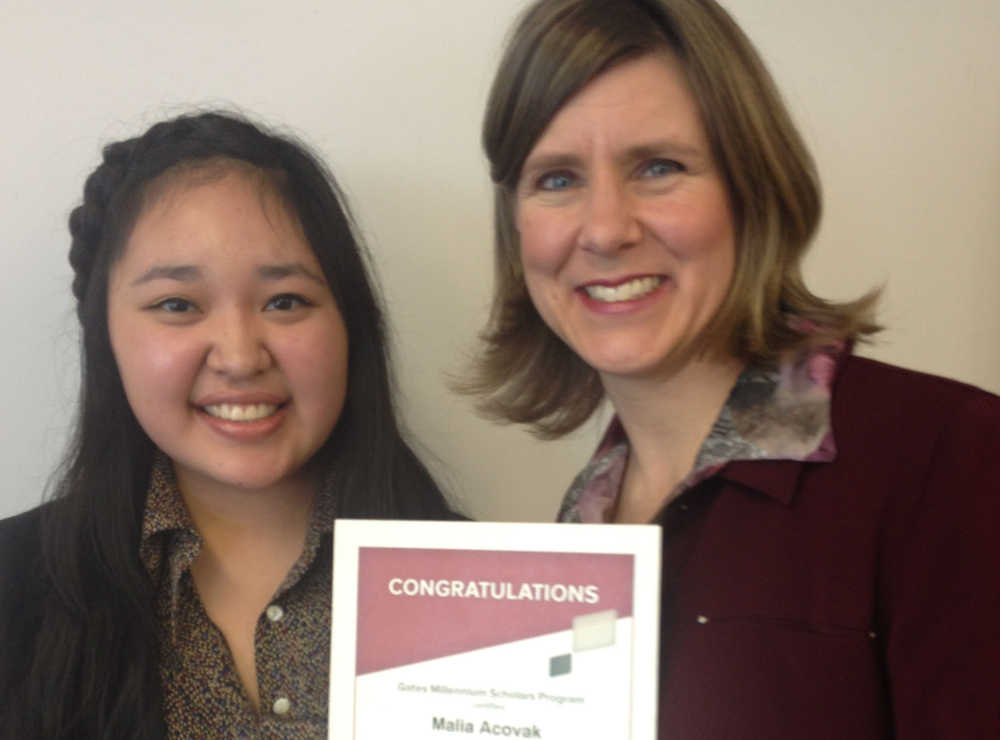When Malia Acovak learned she would have her entire college education paid for, she started screaming in the middle of the Seward post office.
Acovak, a Seward High School graduate, is one of the first two Kenai Peninsula Borough School District recipients of the Bill and Melinda Gates Millennium Scholarship.
“There were strangers there but I was screaming,” Acovak said. “I was relieved. I take the same way home every day and I missed the turn.”
Acovak and Tiffany Lopez, who graduated from Nikiski Middle-High School, will have ten years to complete an undergraduate education and are eligible to apply for funding for a graduate degree program. Throughout the nation, 1,000 students are offered the scholarship each year.
“I am thrilled that two students from KPBSD were among the first scholarship recipients in Alaska,” said Superintendent Sean Dusek. “I anticipate more in the future. The future opportunities for these students (are) exceptional.”
The foundation will cover the cost of attendance and tuition, books, room and board, and other costs related to the education.
Securing the scholarship is not easy. The process takes one full school year to complete, including writing eight essays, maintaining a 3.3 grade-point-average and gaining acceptance into a college or university.
Acovak said she was confident finishing the papers on top of her schoolwork would be a breeze.
“I thought it was totally doable, but as school went on, on top of taking classes and extracurricular activities, I thought it was hard to come up with things to write about,” Acovak said.
Applicants were asked to craft responses to topics such as what kind of leadership roles they have held in their community, what subjects they excel in and discuss a time in their life they felt they were treated unfairly.
Acovak said, by answering the questions honestly, it helped her come to terms with experiences from her past. She wasn’t happy growing up in New Stuyahok, a rural village near Dillingham.
“Stuff at home wasn’t the best,” Acovak said. “You have to write about the past and put in details even though it is really hard.”
Her teacher and mentor Jennifer Swander helped Acovak through the process, and was in fact the one that encouraged her to apply last year. It was at the end-of-school picnic, Acovak said.
Last spring, former superintendent Dr. Steve Atwater had English teachers from around the school district attend a conference called ‘Talk Story, Write Story,’ which introduced the foundation’s scholarship process to educators as a way to help improve their students’ future, Swander said. She said Acovak was one of the students she identified as qualified, willing and able to secure the scholarship.
More than 50,000 students apply annually, Swander said. That equates to a 2 percent chance of winning the scholarship, but they can’t go into the process with that mentality, she said.
“A lot of kids don’t give themselves the chance,” Swander said. “You have to see yourself as the winner. I handed Malia a binder that said ‘Future Millennium Scholar.’ Kids have to say ‘I am worth it.’”
Acovak is completely deserving of the full-ride, Swander said. She has overcome so much and was able to translate her experiences into the essays well enough to show the foundation her character and that they should invest in her future, Swander said.
Not many students have the drive to commit to revising the essays, Swander said. When Acovak presented Swander with a first draft in response to a prompt about a time she was treated unfairly, her teacher handed it back and asked if that was really the most unfair thing she had gone through.
“Was it really the worse time, or was it when your mom was an alcoholic and never came home?” Swander had asked Acovak. “You have to tell your story. Malia persevered and sacrificed and is worth the money.”
Dusek said the professional development for school district teachers assisting their students in scholarship applications is also a good investment.
“It took a lot of time and effort from staff and the students to complete the extensive application process,” Dusek said.
The Gates Millennium Scholars Program was founded to provide an education for “outstanding African American, American Indian-Alaska Native, Asian Pacific Islander American and Hispanic American students,” according to the website. Winners can pursue an undergraduate degree in any field, but are limited to specific disciplines for graduate degree programs.
Acovak will be attending the University of Hawaii in Manoa and for an undergraduate degree in biomedical sciences and finish a doctorate degree before the ten-year tuition ends.
Had she not received the scholarship, Acovak would have attended the University of Alaska Fairbanks. She said both have good science programs, but she has family in Hawaii, and her grandmother will be just a few minutes away from her.
“(The process) helped me appreciate where I am from. It wasn’t only looking back and appreciating my past,” Acovak said. “It was also looking forward and appreciating my future.”
Swander said it is important for the school district to make the scholarship known to students who could benefit from it in the future.
Reach Kelly Sullivan at kelly.sullivan@peninsulaclarion.com.

